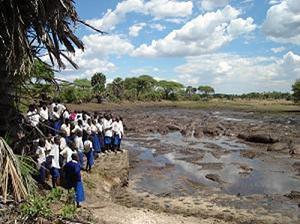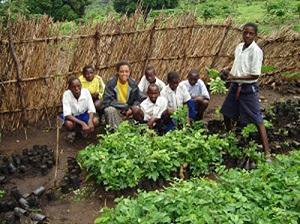Caroline Chumo
Public schoolchildren in Mpimbwe Division participate in conservation education through national park field trips, tree planting and sustainable poultry keeping.

Watching hippos.
East Africa is renowned for its well protected network of national parks, including Serengeti and Lake Nakuru, but in reality many parks are threatened by illegal logging and poaching driven by an expanding population struggling to increase living standards. While wildlife conservationists debate the management of protected areas, they are united in the belief that child education is vital to long-term conservation. In conjunction with the local CBO, MIMAMPI, this project will introduce children to a nearby national park and follow-up with classroom enrichment and practical projects, tree and poultry farming, to respectively counter local logging and poaching.

Nursery.
The community south of one of Africa's most remote protected areas, Katavi National Park, is uniquely suited for environmental education. The British removed the Pimbwe from their hunting grounds in 1927 to prevent sleeping sickness and create a game reserve, but the ethnic group has since adapted poorly to agropastoralism and continues to depend on park resources. MIMAKI (MIMAMPI's predecessor) demarcated land in 2004 to buffer park access. While the buffer zone is known locally, it must complete national registration as a wildlife management area prior to starting government funded monitoring. Meanwhile, public education will spark pride in the park's biodiversity and economic importance and promote upcoming wildlife management plans.
In December 2006, President Kikwete's annual national address highlighted public education and tree-planting as central to environmental protection. This project supports Tanzania's environmental goals by boosting capacity to teach conservation and bringing the tree-planting campaign to a remote region. Students will observe animals that many of them eat illegally, such as elephant or impala, and see uncommon species like the white giraffe sacred to Pimbwe tradition. In follow-up debates and role plays students will become conversant in wildlife management issues.
Children will also improve their environment and learn practical hands-on skills. The tree nurseries, already successfully piloted in one village, will introduce students to commercial cultivation and provide a seedling pool for strategic reforestation in the buffer zone. A poultry project will promote hygiene, nutrition and vaccination in order to reduce the annual chicken blights. Selected pupils will assist MIMAMPI in concurrent division-wide poultry outreach. By the end of this pilot project, 1600 pupils will have learned sustainable improved tree and poultry farming, have greater earning potential and less incentive to hunt and harvest wood illegally in nearby protected areas.
Main partners for this work include Tanzania National Parks, specifically the Community Conservation Services Warden, as well as the the District Education, Natural Resources and Livestock Offices.